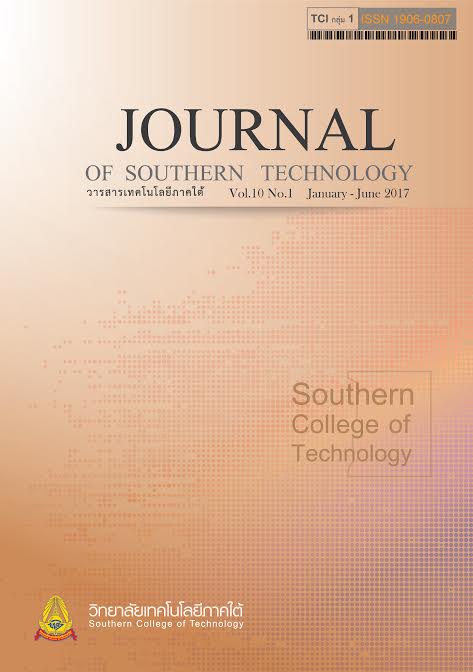การบูรณาการแผนภาพข้อมูลเพื่อสนับสนุนการตัดสินใจส่งเสริมการรับรู้สิทธิตามพรบ. ผู้สูงอายุ พ.ศ.2546 ในจังหวัดนครศรีธรรมราช
Main Article Content
Abstract
การบูรณาการแผนภาพข้อมูลเพื่อสนับสนุนการตัดสินใจส่งเสริมการรับรู้สิทธิตามพรบ. ผู้สูงอายุ พ.ศ.2546 ในจังหวัดนครศรีธรรมราช
การวิจัยนี้มีวัตถุประสงค์ (1) เพื่อพัฒนาระบบสารสนเทศเพื่อการดูแลผู้สูงอายุให้แก่ทีมที่มีส่วนในการดูแลผู้สูงอายุใช้ สนับสนุนการตัดสินใจกําหนดบริการส่งเสริมการรับรู้สิทธิตามตามพระราชบัญญัติ (พรบ.) ผู้สูงอายุ พ.ศ. 2546 ที่เหมาะสมกับ สภาพแท้จริงของผู้สูงอายุ และ (2) เพื่อศึกษาผลของการใช้ระบบสารสนเทศที่พัฒนาขึ้น กลุ่มตัวอย่าง ได้แก่ (1) ผู้สูงอายุ เปิด ตาราง Yamane ได้จํานวน 400 คน จาก 6 อําเภอ ในจังหวัดนครศรีธรรมราช ได้แก่ ทุ่งสง นาบอน ทุ่งใหญ่ บางขัน ร่อน พิบูลย์ และ พระพรหม และ (2) กลุ่มผู้ใช้งานระบบสารสนเทศ เลือกแบบเจาะจง จํานวน 102 คน เก็บข้อมูลความต้องการใช้ งานระบบสารสนเทศ และข้อมูลการรับรู้สิทธิตามตามพรบ. ผู้สูงอายุ พ.ศ.2546 ของผู้สูงอายุ ใช้แบบสอบถาม พัฒนาระบบ สารสนเทศด้วยเทคโนโลยีเว็บและซอฟต์แวร์ในกลุ่มมาตรฐานเปิด พัฒนาเครื่องมือคํานวณอัตโนมัติโดยใช้หลักสถิติ เช่น ร้อย ละ และวิเคราะห์ข้อมูลอันดับด้วยค่าเฉลี่ย และค่าเบี่ยงเบนมาตรฐานด้วยโปรแกรม SPSS ผลการวิจัยพบว่า การพัฒนาระบบสารสนเทศด้วยเทคโนโลยีเว็บและการบูรณาการแผนภาพข้อมูล เพื่อนําเสนอ ข้อมูลเชิงพื้นที่ แผนภูมิและตารางเชิงสัมพันธ์ ทําให้ผู้ใช้ระบบมีความพึงพอใจภาพรวมในระดับมาก ( =3.95, S.D.=0.44) เมื่อพิจารณาทั้ง 3 ด้าน พบว่า ผู้ใช้งานระบบ พึงพอใจด้านการประมวลผลและความเสถียรของระบบ มากที่สุด (
=3.99, S.D.=0.47) รองลงมาคือ การนําไปใช้ประโยชน์ (
=3.98, S.D.=0.48) และ ด้านการออกแบบ (
=3.89, S.D.=0.56) สรุป ได้ว่าระบบสารสนเทศที่พัฒนาขึ้นโดยใช้การบูรณาการข้อมูลการรับรู้สิทธิตามพรบ. ผู้สูงอายุ พ.ศ.2546 ของผู้สูงอายุร่วมกับ ข้อมูลเชิงพื้นที่และข้อมูลเบื้องต้น แล้วนําเสนอในรูปแบบแผนภาพ ช่วยสนับสนุนการตัดสินใจของผู้มีส่วนเกี่ยวข้องในการดูแล ผู้สูงอายุในชุมชนได้ดีขึ้น
Integrated Information Visualization to Support Decision Making for Promotion of Older Persons’ Perceptions toward Human Rights Following the Act on Older Persons B.E. 2546 in Nakhon Si Thammarat, Thailand
This research aims (1) to develop the information system for elderly care as a tool for the elderly care participants to support decision making for creating proper promotion of older persons’ perceptions toward human rights following the act on older persons B.E. 2546, and (2) to evaluate the effectiveness and user perception of the system. The samples were (1) 400 older persons using Yamane table from six districts in Nakhon Si Thammarat province including Thung Song, Na Bon, Thung Yai, Bang Khan, Ron Phibun, and Pra Phrom districts, and (2) 102 system users using purposive sampling. User requirements and data of older persons’ perceptions toward human rights following the act on older persons B.E. 2546 were collected using questionnaires. The system was developed using web-based technology and open standards. We developed automatic calculation tools using statistical analysis concepts, such as percentages (%). Ordinal data were described with mean values and standard deviations (S.D.) using SPSS. The research found that the information system development using web-based technology and integrated information visualization to present as spatial data, charts, and dimension tables was satisfied from users. The overall average for user satisfaction with the system was at a high level ( =3.95, S.D.=0.44). Focusing on three main headings, we found that the user rating were highest in satisfaction with data processing and system stability (
=3.99, S.D.=0.47), followed by utilization (
=3.98, S.D.=0.48), and designing (
=3.89, S.D.=0.56). In conclusion, the system integrated information of older persons’ perceptions toward human rights following the act on older persons B.E. 2546 combined with spatial data and general information visualized in dashboard could improve decision making for the elderly cares.
Article Details
-
Authors must agree to the journal publication rules and allow the editors to edit the manuscripts for publication.
-
Author’s right belongs to the author but Journal of Southern Technology holds the right of first publication and thus allow readers to use the article for the purpose of education but not commercial.

